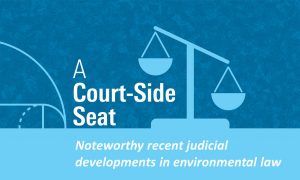Federal Courts of Appeal
Dam Claims Collapse
On May 7, 2019, the U.S. Court of Appeals for the Eleventh Circuit decided the case of Navelski, et al. v. International Paper Company. After a major storm, a dam constructed by International Paper to serve the operations of its local paper mill, was breached, releasing millions of gallons of water into a nearby creek resulting in the flooding of many homes located downstream from the creek. IP was sued by the homeowners in a class action, alleging negligence and strict liability for conducting an abnormally dangerous activity. The trial court dismissed the strict liability claim, and the jury found IP was not negligent in the operation of the dam. On appeal, the court upheld the jury verdict, agreeing that the verdict was supported by the evidence heard by the jury. The appeals court also agreed that the strict liability claim was properly dismissed as a matter of law because the operation of this dam was not an abnormally dangerous activity under Florida law. The plaintiffs had also argued that the jury should not have been advised that the home county, Escambia County, has applied for a FEMA grant which apparently made the case that some of the downstream homes were naturally prone to flooding. A redacted version of the application was allowed to be shown to the jury, but the appeals court held that the plaintiffs had not demonstrated that the court ruling was prejudicial.
Continue Reading ›
 Gravel2Gavel Construction & Real Estate Law Blog
Gravel2Gavel Construction & Real Estate Law Blog



